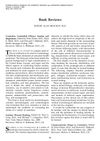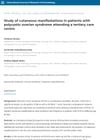 11 citations,
December 2014 in “Clinical Obstetrics and Gynecology”
11 citations,
December 2014 in “Clinical Obstetrics and Gynecology” Obstetrician/gynecologists can diagnose and manage female hair loss with careful history taking and examination.
 8 citations,
November 2020 in “Optics and Laser Technology”
8 citations,
November 2020 in “Optics and Laser Technology” LED light therapy is effective for skin and hair treatments but requires careful use to minimize risks.
 4 citations,
January 2015 in “Journal of Mid-life Health”
4 citations,
January 2015 in “Journal of Mid-life Health” The most common skin problems in perimenopausal women in South India are infections, eczemas, and acne, possibly worsened by external factors and lifestyle practices.
 3 citations,
November 2016 in “The journal of investigative dermatology/Journal of investigative dermatology”
3 citations,
November 2016 in “The journal of investigative dermatology/Journal of investigative dermatology” Entrepreneurial companies are key to advancing dermatology treatments and patient care.
 1 citations,
November 2022 in “Journal of Dermatological Treatment”
1 citations,
November 2022 in “Journal of Dermatological Treatment” Platelet-rich plasma can increase hair density and may help treat some skin conditions, but it's costly, not FDA-approved, and needs more research.
 July 2024 in “Forum Dermatologicum”
July 2024 in “Forum Dermatologicum” Topical treatments for hair loss can be effective but need careful safety evaluation.
 June 2022 in “Indian Dermatology Online Journal”
June 2022 in “Indian Dermatology Online Journal” Teledermatology effectively managed most skin conditions remotely during the COVID-19 pandemic.
October 2019 in “Obsgyne Review Journal of Obstetric and Gynecology of Siddharth Health Research and Social Welfare Society” The document's conclusion cannot be provided as the content is not available for summarization.

The document concludes that diagnosing female hair loss requires careful examination, with treatments varying by condition and psychological support often necessary.
 January 2009 in “Springer eBooks”
January 2009 in “Springer eBooks” The document concludes that treating skin conditions should include psychological care and a multidisciplinary approach is essential for effective management.
 March 2001 in “International Journal of Cosmetic Surgery and Aesthetic Dermatology”
March 2001 in “International Journal of Cosmetic Surgery and Aesthetic Dermatology” The document covers books on cosmetic surgery and skin care, discussing legal and ethical issues, wound healing, the overlap of cosmetics and drugs, and detailed plastic surgery techniques.
 155 citations,
August 1991 in “Journal of The American Academy of Dermatology”
155 citations,
August 1991 in “Journal of The American Academy of Dermatology” Methotrexate treats various disorders by inhibiting DNA synthesis, but careful monitoring is needed to avoid toxicity and manage side effects.
 90 citations,
June 2006 in “The American Journal of Dermatopathology”
90 citations,
June 2006 in “The American Journal of Dermatopathology” The document concludes that accurate diagnosis of different types of hair loss requires careful examination of hair and scalp tissue, considering both clinical and microscopic features.
 47 citations,
January 2003 in “American Journal of Clinical Dermatology”
47 citations,
January 2003 in “American Journal of Clinical Dermatology” Mood stabilizers can cause serious skin reactions; careful monitoring and immediate treatment are crucial.
 33 citations,
November 2014 in “Military Medicine”
33 citations,
November 2014 in “Military Medicine” The U.S. military's teledermatology program was effective in providing fast and successful skin care in remote locations, preventing unnecessary evacuations.
 32 citations,
November 1996 in “International Journal of Dermatology”
32 citations,
November 1996 in “International Journal of Dermatology” Antiandrogens can help treat skin conditions like acne and excessive hair in women when used carefully.
 24 citations,
March 2018 in “Pediatric Dermatology”
24 citations,
March 2018 in “Pediatric Dermatology” Testosterone treatment in transgender teens can worsen acne, requiring careful treatment due to mental health and medication side effects.
6 citations,
April 2023 in “Cosmetics” Exosomes could be effective for improving skin health and treating skin diseases.
 3 citations,
November 2010 in “Rheumatic Diseases Clinics of North America”
3 citations,
November 2010 in “Rheumatic Diseases Clinics of North America” Pregnancy can cause symptoms similar to rheumatic diseases, making diagnosis difficult, and affects various body systems, requiring careful distinction between normal changes and serious conditions.
 2 citations,
September 2007
2 citations,
September 2007 Surgical hair restoration involves moving hair from a non-balding area to a balding area, with the transplanted hair not subject to male pattern baldness. Medications can slow hair loss and regrow some hair, but successful treatment needs careful planning, skill, and ethical responsibility due to progressive hair loss and limited donor hair.
 1 citations,
March 2011 in “Informa Healthcare eBooks”
1 citations,
March 2011 in “Informa Healthcare eBooks” Isotretinoin is a preferred treatment for severe acne, often leading to long-term improvement, but requires careful monitoring due to potential side effects.
 July 2019 in “International Journal of Research in Dermatology”
July 2019 in “International Journal of Research in Dermatology” Women with PCOS often have acne, obesity, and excess hair, especially on the chin and upper lip.
 January 2009 in “Springer eBooks”
January 2009 in “Springer eBooks” The document concludes that managing skin conditions during pregnancy is important and requires specialized care.
October 2022 in “International Journal of Research in Dermatology” Hormonal imbalances contribute to female hair loss, and trichoscopy is a useful diagnostic tool.
 130 citations,
October 2006 in “Allergy”
130 citations,
October 2006 in “Allergy” Allergic reactions to blood thinners are rare but can be serious, requiring careful testing and alternative treatments.
 126 citations,
October 1983 in “Journal of The American Academy of Dermatology”
126 citations,
October 1983 in “Journal of The American Academy of Dermatology” Isotretinoin effectively treats severe acne and similar conditions, but has common, mostly reversible side effects, requiring careful patient monitoring.
 76 citations,
December 2009 in “Clinics in Dermatology”
76 citations,
December 2009 in “Clinics in Dermatology” Hormonal treatments can help with acne but are not the first choice due to side effects and the need for careful patient selection.
 53 citations,
May 2001 in “The American journal of the medical sciences”
53 citations,
May 2001 in “The American journal of the medical sciences” Chemotherapy can cause various skin problems, and recognizing them helps improve patient care.
 48 citations,
February 2017 in “Journal of Cosmetic Dermatology”
48 citations,
February 2017 in “Journal of Cosmetic Dermatology” The conclusion is to use scalp cooling, gentle hair care, and treatments like minoxidil for managing hair loss from chemotherapy, and stresses the need for more research and collaboration in this area.
 42 citations,
April 2021 in “Journal of clinical pharmacology”
42 citations,
April 2021 in “Journal of clinical pharmacology” Baricitinib helps treat several diseases, including COVID-19, but has side effects and needs careful monitoring.



























